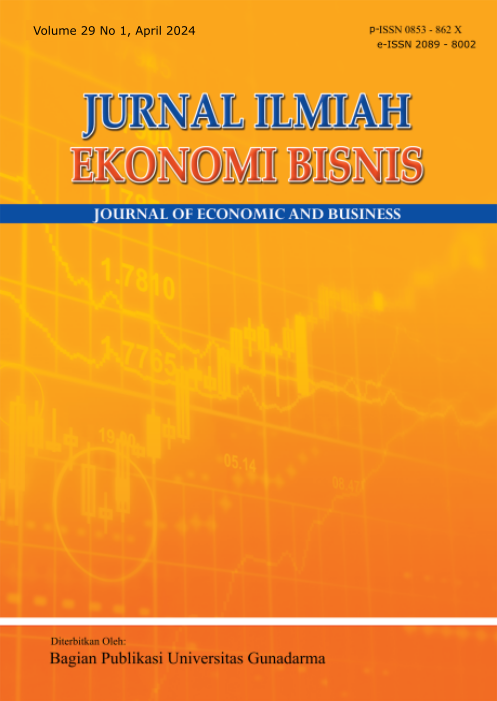PENGARUH KETERBUKAAN DAN PERTUMBUHAN EKONOMI TERHADAP KUALITAS LINGKUNGAN STUDI NEGARA G20
UIN Sunan Kalijaga Yogyakarta
Indonesia
UIN Sunan Kalijaga Yogyakarta
Indonesia
Abstract
Hubungan antara keterbukaan dan pertumbuhan ekonomi serta kualitas lingkungan telah menjadi persoalan pelik sejak lama. Apakah keterbukaan dan pertumbuhan ekonomi berpengaruh terhadap kualitas lingkungan. Penelitian ini betujuan untuk mengukur dan menjelaskan hubungan variabel independen keterbukaan ekonomi yang diproksikan Free Trade (TRADE) dan Foreign Direct Invesment (FDI) dan pertumbuhan ekonomi yang diproksikan Gros Domestic Product per Capita (GDPC) dan pertumbuhan penduduk (POPULASI) terhadap kualitas lingkungan yang diproksikan dengan Per Capita Carbon Dioxide (CO2C) Emission. Populasi yang dimasukkan dalam penelitian ini ialah negara G20. Sampel yang dipakai yaitu negara G20 sebanyak 9 negara yaitu Amerika Serikat, Australia, Inggris, Italia, Jepang, Jerman, Kanada, Republik Korea, dan Prancis. Metode untuk mengalisis data di penelitian ini ialah regresi data panel dan diolah dengan pendekatan Fixed Effect Model (FEM) serta menggunakan bantuan aplikasi Econometric Views 10 (Eviews 10). Hasil penelitian menunjukkan FDI tidak berpengaruh signifikan terhadap kualitas lingkungan, sedangkan TRADE, GDPC, dan POPULASI berpengaruh signifikan terhadap kualitas lingkungan.
Keywords
References
A’yun, I. Q., & Khasanah, U. (2022). The Impact of Economic Growth and Trade Openness on Environmental Degradation: Evidence from A Panel of ASEAN Countries. Jurnal Ekonomi & Studi Pembangunan, 23(1), 81–92. https://doi.org/10.18196/jesp.v23i1.13881
Anwar, N., & Elfaki, K. E. (2021). Examining the Relationship Between Energy Consumption, Economic Growth, and Environmental Degradation in Indonesia: Do Capital and Trade Openness Matter? Int. Journal of Reneweble Energy Development, 10(4), 769–778. https://doi.org/10.14710/ijred.2021.37822
Dinda, S. (2004). Environmental Kuznets Curve hypothesis: A survey. Ecological Economics, 49(4), 431–455. https://doi.org/10.1016/j.ecolecon.2004.02.011
Dosch, F., & Porsche, L. (2011). Rebuild the City! Towards Resource-efficient Urban Structures through the Use of Energy Concepts, Adaptation to Climate Change, and Land Use Management. (2003), 35–48. https://doi.org/10.1007/978-3-642-12785-4_4
Ehrlich, P., & Holdren, J. (1972). Impact of population growth. Population, resources, and the environment, 3, 365–377. https://doi.org/10.1097/00006254-197111000-00014
G20. (2023). G20 – Background Brief.
Grossman, G. M., & Krueger, A. B. (1991). Environmental impacts of a North American free trade agreement. (3914).
Hasni, D. A., & Azhar, Z. (2021). Pengaruh Investasi, Kepadatan Penduduk, dan Jumlah Transportasi Terhadap Degradasi Lingkungan di Indonesia. Jurnal Kajian Ekonomi dan Pembangunan, 3(2), 25–32.
IPCC. (2022). Climate Change 2022 - Mitigation of Climate Change - Full Report. In Cambridge University Press.
Karedla, Y., Mishra, R., & Patel, N. (2021). The impact of economic growth, trade openness and manufacturing on CO2 emissions in India: an autoregressive distributive lag (ARDL) bounds test approach. Journal of Economics, Finance and Administrative Science, 26(52), 376–389. https://doi.org/10.1108/JEFAS-05-2021-0057
Kayani, F. N., & Sadiq, M. (2022). Analyzing the Impact of Inward FDI and Economic Growth on CO2 Emissions of Ukraine. International Journal of Energy Economics and Policy, 12(5), 202–208. https://doi.org/10.32479/ijeep.13395
Kuznets, S. (1955). Economic Growth and Income Inequality. The American Economic Review, 45(1), 1–28.
Rahman, M. M. (2020). Exploring the effects of economic growth, population density and international trade on energy consumption and environmental quality in India. International Journal of Energy Sector Management, 14(6), 1177–1203. https://doi.org/10.1108/IJESM-11-2019-0014
Safdar, N., Ghaffar, H., Farooq, F., & Liaquat, M. (2020). Trade Liberalization, Economic Growth and Environmental Quality Nexus: An Empirical Evidence from Pakistan. Journal of Accounting and Finance in Emerging Economies, 6(4), 10077–11087.
Spilker, G., Koubi, V., & Bernauer, T. (2017). International Political Economy and the Environment. Oxford Research Encyclopedia of Politics.
Umniati, A. M. (2015). ANALISIS PENGARUH PERTUMBUHAN EKONOMI, POPULASI, DAN TEKNOLOGI TERHADAP PERUBAHAN KUALITAS LINGKUNGAN DI NEGERA OECD (ORGANISATION FOR ECONOMIC CO-OPERATION AND DEVELOPMENT). Jurnal Ilmiah Mahasiswa FEB, 3(2), 1–17.
Wang, Y., & Huang, Y. (2022). Impact of Foreign Direct Investment on the Carbon Dioxide Emissions of East Asian Countries Based on a Panel ARDL Method. Frontiers in Environmental Science, 10, 1–10. https://doi.org/10.3389/fenvs.2022.937837
Zubair, A. O., Abdul Samad, A. R., & Dankumo, A. M. (2020). Does gross domestic income, trade integration, FDI inflows, GDP, and capital reduces CO2 emissions? An empirical evidence from Nigeria. Current Research in Environmental Sustainability, 2, 100009. https://doi.org/10.1016/j.crsust.2020.100009


